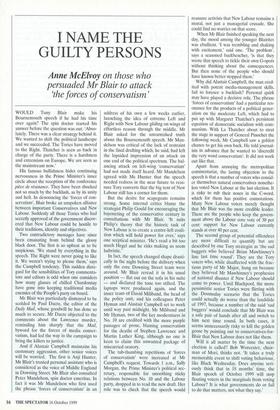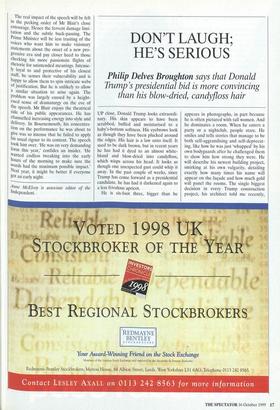I NAME THE GUILTY PERSONS
Anne McElvoy on those who persuaded Mr Blair to attack 'the forces of conservatism'
WOULD Tony Blair make his Bournemouth speech if he had his time over again? The spin doctor started his answer before the question was out. 'Abso- lutely. There was a clear strategy behind it. We wanted to shift the political landscape and we succeeded. The Tories have moved to the Right. Thatcher is seen as back in charge of the party. There is a harshness and extremism on Europe. We are seen as the mainstream now.'
His famous bullishness hides continuing nervousness in the Prime Minister's inner circle about the reception of the conference piece de resistance. They have been shocked not so much by the backlash, as by its unity and heft. In denouncing the 'forces of con- servatism', Blair broke an unspoken alliance between important Conservatives and New Labour. Suddenly all those Tories who had secretly approved of the government discov- ered that New labour could be hostile to their traditions, identity and objectives.
Two contradictory messages have since been emanating from behind the glossy black door. The first is so upbeat as to be suspicious. 'We stand by everything in the speech. The Right were never going to like it. We weren't trying to please them,' says the Campbell tendency. This sudden disre- gard for the sensibilities of Tory commenta- tors and editors is odd when one considers how many glasses of chilled Chardonnay have gone into keeping traditional media enemies of the People's party on board.
Mr Blair was particularly dismayed to be scolded by Paul Dacre, the editor of the Daily Mail, whose goodwill he has done so much to secure. Mr Dacre objected to the comments about the Lawrence murder, reminding him sharply that the Mail, byword for the forces of media conser- vatism, had led the way in the campaign to bring the killers to justice.
And if Alastair Campbell maintains his customary aggression, other senior voices will be worried. The first is Anji Hunter, Mr Blair's trusted personal assistant who is considered as the voice of Middle England in Downing Street. Mr Blair also consulted Peter Mandelson, spin doctor emeritus. In fact it was Mr Mandelson who first used the phrase 'forces of conservatism' in an address of his own a few weeks earlier, launching the idea of extreme Left and Right with New labour gliding on wings of effortless reason through the middle. Mr Blair asked for the unvarnished truth about the Bournemouth speech. Mr Men- delson was critical of the lack of restraint in the final drafting which, he said, had left the lopsided impression of an attack on one end of the political spectrum. The bal- ancing attack on left-wing 'conservatism' had not made itself heard. Mr Mendelson agreed with Ms Hunter that the speech needed redress in the near future to reas- sure Tory converts that the big tent of New Labour still has a corner for them.
But the desire for scapegoats remains strong. Some internal critics blame the strategist Philip Gould for encouraging the bayoneting of the conservative century in consultations with Mr Blair. 'It suits Philip's theory that the historic task of New Labour is to create a centre-left coali- tion which will hold power for ever,' says one sceptical minister. 'He's read a bit too much Hegel and he risks making us seem hubristic.'
In fact, the speech changed shape drasti- cally in the night before the delivery when only the core Downing Street team were around. Mr Blair reread it in his usual position -7 flat out on the sofa in his suite — and declared the tone too stilted. The laptops were produced again, and the inner team of David Miliband, the head of the policy unit, and his colleagues Peter Hyman and Alastair Campbell set to work until way past midnight. Mr Miliband and Mr Hyman, two of the key modernisers in No. 10 are credited with the more purple passages of prose, blaming conservatism for the deaths of Stephen Lawrence and Martin Luther King, although no one is keen to claim this unwanted package of miscarried oratory.
The tub-thumbing repetitions of 'forces of conservatism' were increased at Mr Campbell's request. Towards 1 a.m., Sally Morgan, the Prime Minister's political sec- retary, responsible for smoothing sticky relations between No. 10 and the Labour party, dropped in to read the new draft. Her role was to check that the speech would reassure activists that New Labour remains a moral, not just a managerial crusade. She could find no worries on that score.
When Mr Blair finished speaking the next day, the mood among the younger Blairites was ebullient. 'I was trembling and shaking with excitement,' said one. 'The problem', says a seasoned backbencher, 'is that they wrote that speech to tickle their own G-spots without thinking about the consequences. But then none of the people who should have known better stopped them.'
Why did Alastair Campbell, the man cred- ited with potent media-management skills, fail to foresee a backlash? Personal quirk may have played a decisive role. The phrase 'forces of conservatism' had a particular res- onance for the products of a political gener- ation on the moderate Left, which had to put up with Margaret Thatcher's persistent equation of democratic socialism with com- munism. With La Thatcher about to strut the stage in support of General Pinochet the following week, Mr Campbell saw a golden chance to get his own back. He told journal- ists in advance that he wanted to 'discredit the very word conservatism'. It did not work out like that.
Apart from annoying the metropolitan commentariat, the lasting objection to the speech is that a number of voters who consid- er themselves natural conservatives nonethe- less voted New Labour at the last election. It is risky to rub their noses in the C-word, which for them has positive connotations. Many New Labour voters merely thought that Mr Blair was the more credible leader. These are the people who keep the govern- ment above the Labour core vote of 30 per cent: support for New Labour currently stands at over 40 per cent.
The second group of potential offendees are more difficult to quantify but are described by one Tory strategist as 'the sad buggers who believed Brian Mawhinney's line last time round'. They are the Tory voters who, while disaffected with the frac- tious party of Mr Major, hung on because they believed Mr Mawhinney's prophesies of national disaster if New Labour should come to power. Until Blackpool, the more pessimistic senior Tories were flirting with the Doomsday scenario that the Tories could actually do worse than the landslide of 1997, because a number of the said 'sad buggers' would conclude that Mr Blair was a safe pair of hands after all and switch to him next time round. In both cases, it seems unnecessarily risky to kill the golden goose by pointing out to conservatives-for- Blair that New Labour does not like them.
Will it all matter by the time the next election is called? Bob Worcester, chair- man of Mori, thinks not. 'It takes a truly memorable event to shift voting behaviour, like Black Wednesday. Does anyone seri- ously think that in 18 months' time, the Blair speech of October 1999 will stop floating voters in the marginals from voting Labour? It is what governments do or fail to do that matters, not what they say.'
The real impact of the speech will be felt in the pecking order of Mr Blair's close entourage. Hence the fervent damage limi- tation and the subtle buck-passing. The Prime Minister will be less trusting of the voices who want him to make visionary statements about the onset of a new pro- gressive era and pay closer heed to those checking his more passionate flights of rhetoric for unintended meanings. Intense- 1Y loyal to and protective of his closest staff, he senses their vulnerability and is happy to allow them to spin intricate webs of justification. But he is unlikely to allow a similar situation to arise again. The problem was largely caused by a height- ened sense of dramaturgy on the eve of the speech. Mr Blair enjoys the theatrical side of his public appearances. He has channelled increasing energy into style and delivery. In Bournemouth, his concentra- tion on the performance he was about to give was so intense that he failed to apply his usual rigour to its content. The speech took him over. 'He was on very demanding four' this year,' confides an insider. 'He wanted endless tweaking into the early hours of the morning to make sure the Words had the maximum possible impact.' Next year, it might be better if everyone got an early night.
Anne McElvoy is associate editor of the Independent.



















































































 Previous page
Previous page